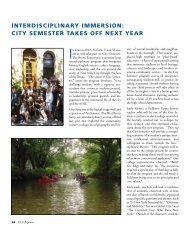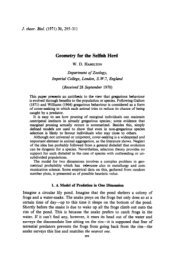Chapter 6 - Ethical Culture Fieldston School
Chapter 6 - Ethical Culture Fieldston School
Chapter 6 - Ethical Culture Fieldston School
Create successful ePaper yourself
Turn your PDF publications into a flip-book with our unique Google optimized e-Paper software.
“Mr. Sinatra Gets Rejected”<br />
With an army of managers, publicists, and promoters, Sinatra pushed on,<br />
expanding his dominions. A series of nightclub appearances at New York’s<br />
Riobamba Club and the Waldorf‐Astoria in 1943 established his appeal with<br />
older, more serious audiences. His appointment as a host of the weekly radio<br />
show Your Hit Parade made him a household word across the country. Signed to<br />
Metro‐Goldwyn‐Mayer, the most prestigious of the movie studios, he prepared<br />
for his first major musical, Anchors Aweigh, by learning how to dance under the<br />
tutelage of Gene Kelly.<br />
But his core constituency remained the bobby‐soxers. On Columbus Day<br />
of 1944, tens of thousands of them rioted at the Paramount, where Sinatra<br />
returned for a series of performances, and where the refusal of those with seats to<br />
vacate them led to the arrival of the police. By now, all the adulation generated<br />
by “The Voice,” as he was known, had become familiar, alternately amusing and<br />
irritating to those who constantly heard about it. Others, however, were<br />
perplexed, even troubled. In a piece for The New Republic shortly after the<br />
Columbus Day riot, writer Bruce Bliven groped to understand what all the fuss<br />
was about:<br />
My strongest impression was not that Frankie means so much to<br />
the bobby‐socksers, as that everything else means so little. Our<br />
civilization no doubt seems wonderful to the children of half‐<br />
starved, dictator‐ridden Europe; our multiplicity of gadgets is the<br />
envy of the world. And yet, if I read the bobby‐socksers aright, we<br />
have left them with a hunger still unfulfilled: a hunger for heroes,<br />
for ideal things that do not appear, or at least not in sufficient<br />
21 Martha Weinman Lear, “The Bobby Sox Have Wilted, but the Memory Remains Fresh,” The New York<br />
American History for Cynical Beginners<br />
20
















